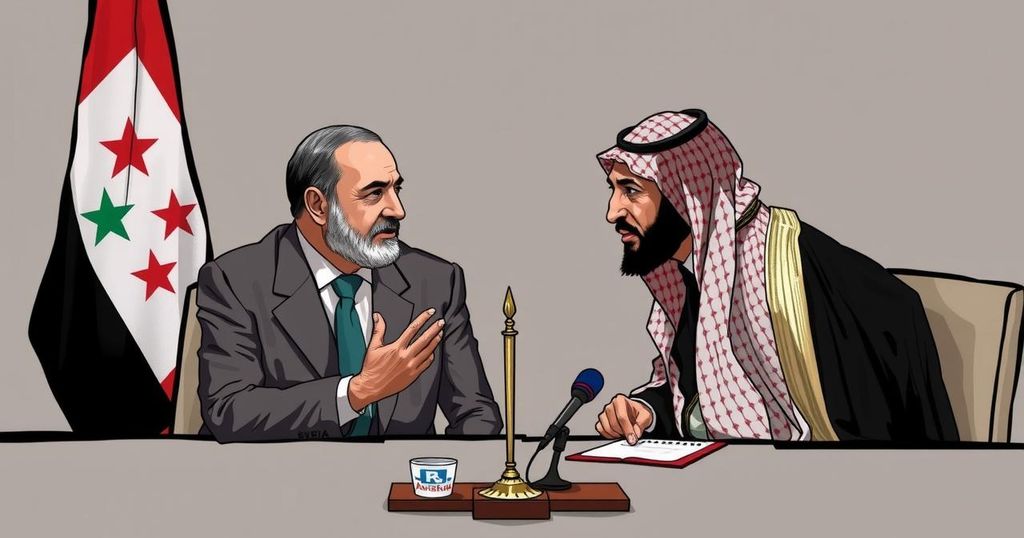Following the ousting of Bashar al-Assad, global governments are engaging with Syria’s new interim rulers. The Islamist-led coup has led to significant celebrations in Syria, prompting diplomatic initiatives from nations including Qatar and Turkey. Amidst calls for justice and rebuilding, international communications with the extremist group HTS remain complex as the country looks forward to a new chapter.
Governments across the globe are intensifying their interactions with Syria’s newly established interim leaders, following the recent ousting of President Bashar al-Assad by Islamist-led rebels. This unexpected regime change, which culminated in a swift takeover of Damascus on December 8, has garnered widespread celebrations both domestically and internationally. A student at Damascus University expressed optimism, stating, “We feel liberated, and the chains have been broken. Fear has been shattered.”
However, the quick transition has caught many nations off guard, prompting a reevaluation of their policies. The extremist group Hayat Tahrir Al Sham (HTS), integral to the coup, remains classified as a terrorist organization by several Western entities. UN envoy Geir Pedersen met with HTS leaders, emphasizing the necessity for a just and inclusive governance model. He remarked on the critical need for accountability, stating, “We need to make sure that that goes through a credible justice system, and that we do not see any revenge.”
In terms of diplomatic relations, a Qatari delegation has arrived in Syria, expressing commitment to support the nation through its transition. Qatar’s embassy is set to resume operations for the first time in thirteen years, contrasting with the approach taken by other Arab nations. Additionally, Turkey has reopened its embassy, indicating a willingness to assist the new government.
Western nations are cautiously engaging as well, with Britain and the United States acknowledging ongoing communications with HTS. British Foreign Minister David Lammy confirmed this contact while announcing an aid package for Syria. Meanwhile, French officials plan to assess the population’s urgent needs and re-establish their diplomatic presence in Damascus.
The end of Assad’s regime, which had resulted from a decade-long civil war steeped in violence, has also led to the liberation of prisoners who suffered horrific abuses. One former detainee recounted, “Towards the end I just wanted to die, waiting for when they would execute us.”
Although a sense of calm is returning, experts warn that extensive rebuilding is required to address the devastation of the country’s governance and infrastructure. Furthermore, HTS’s governance raises concerns regarding the protection of minority rights, although early signs suggest a cautious stability for communities such as Syrian Christians. Current developments suggest that diplomatic efforts are likely to continue evolving amidst the complexities of this transformative period in Syria’s history.
The situation in Syria has drastically reshaped since the ouster of President Bashar al-Assad, a ruler who maintained a brutal regime for over two decades. The recent coup, led by Islamist factions, signifies a shift in control after a prolonged civil war that has resulted in significant loss of life and displacement of people. International actors are adjusting their diplomatic strategies to support the emerging interim government while grappling with the implications of HTS’s rise to power and the pressing humanitarian needs of the Syrian populace. As countries like Turkey and Qatar rekindle their diplomatic ties, the focus remains on facilitating justice and reconstruction in Syria, which has faced systemic structural challenges.
In summary, the recent ousting of President Bashar al-Assad has prompted a significant shift in both the political landscape of Syria and the responses from the international community. Engaging with the newly formed interim government, global leaders are navigating their relationships with HTS while prioritizing aid and justice. As Syria begins to heal from the ravages of war, the collaborative efforts put forth by various nations signal a cautious yet hopeful outlook for the country’s future.
Original Source: jordantimes.com






